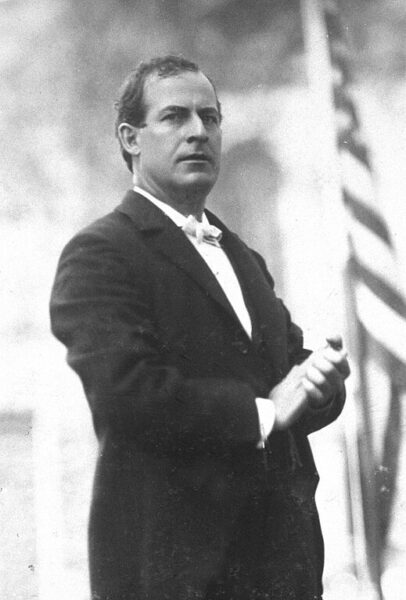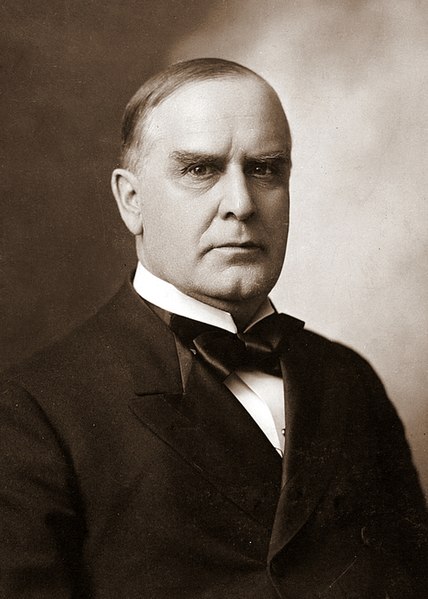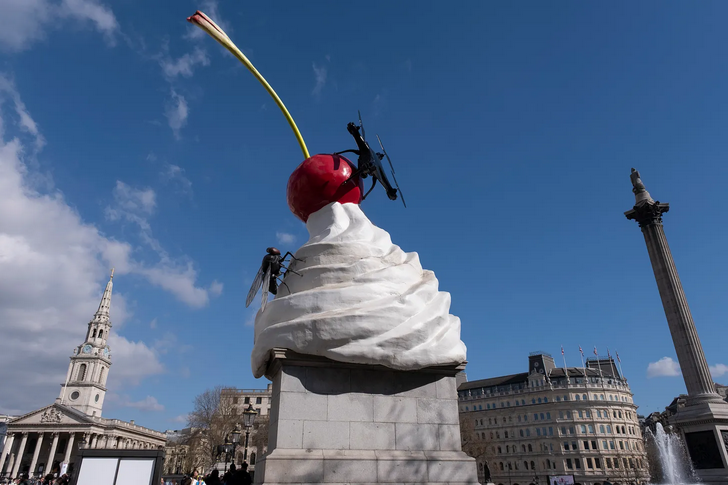Not Just Bikes
Published 6 Oct 2024Chapters
0:00 Intro
1:24 Leaving New York
3:04 On the train
4:03 The views
4:38 Freight trains & delays
5:37 The train is so much more comfortable
7:09 The border crossing
8:17 The Canadian side
9:24 Should you take this train?
10:20 Comparisons to Europe & Japan
11:20 We need more high-speed rail
12:02 VIA Rail is bad … and getting worse
12:58 VIA Rail is expensive!
14:11 The new VIA Rail baggage policy
15:49 Better train service is important!
17:14 Concluding thoughts
(more…)
January 31, 2025
I Spent Over 12 Hours on an Amtrak Train (on purpose)
December 25, 2024
Repost – “Fairytale of New York”
Time:
“Fairytale of New York” by The Pogues featuring Kirsty MacColl
This song came into being after Elvis Costello bet The Pogues’ lead singer Shane MacGowan that he couldn’t write a decent Christmas duet. The outcome: a call-and-response between a bickering couple that’s just as sweet as it is salty.
November 10, 2024
The 1896 US Presidential election
In the latest SHuSH newsletter, Ken Whyte looks back to the 1896 contest between William McKinley and William Jennings Bryan:

William Jennings Bryan, Democratic party presidential candidate, standing on stage next to American flag, 3 October 1896.
LOC photo LC-USZC2-6259 via Wikimedia Commons.
The 1880s and 1890s saw an enormous expansion in the number of newspapers in America. New printing technologies had drastically reduced barriers to entry in the newspaper field, while the emergence of consumer advertising was making the business more lucrative. By the election of 1896, there were forty-eight daily newspapers in New York (Brooklyn had several more), each vying for the attention of some portion of the city’s three million souls. The major papers routinely produced three or four editions a day, and as many as a dozen on a hot news day, making for a 24/7 news environment long before the term was coined. The individual newspapers were distinguished by their politics, ethnic, and class orientations. They advocated vigorously, often shamelessly, and occasionally dishonestly for the interests of their readers. Similar dynamics were afoot everywhere. America, in the 1890s, was noisy as hell.
Republican nominee William McKinley was the respectable candidate in 1896, heavily favoured. He had a state-of-the-art organization, buckets of money, and vast newspaper support, even among important Democratic publishers such as Joseph Pulitzer. The Democrats fielded William Jennings Bryan, who looked to be the weak link in his own campaign. He was a relatively unknown and untested ex-congressman from Nebraska, just thirty-six-years-old, a messianic populist with a mesmerizing voice and radical views. A last-minute candidate, he was selected on the convention floor over Richard P. Bland, against the protests of the party establishment.
Bryan broke all the norms of politics in 1896. At the time, it was believed that the dignified approach to campaigning was to sit on one’s porch and let party professionals speak on one’s behalf. Grover Cleveland had made eight speeches and journeyed 312 miles in his three presidential campaigns (1884, 1888, 1892). Bryan spent almost his entire campaign on the rails, holding rallies in town after town. He travelled 18,000 miles and talked to as many as five million Americans. He unabashedly championed the indigent and oppressed against Wall Street and Washington elites.
Inflation was the central issue of the 1896 campaign. The US was on the gold standard at the time, meaning that the amount of money in circulation was limited by the amount of gold held by the treasury. Gold happened to be scarce, resulting in an extended period of deflation, a central factor in the major economic depression of the early 1890s. The effects were felt disproportionately by the poor and working class. Bryan advocated the monetization of silver (in addition to gold) as a means of increasing the money supply and reflating the economy. This was viewed by the establishment as an economic heresy (not so much today). Bryan was viewed as a saviour by his followers, and that’s certainly how he saw himself.
The New York Sun heard among the Democrats “the murmur of the assailants of existing institutions, the shriek of the wild-eyed”. The New York Herald warned that Bryan’s supporters, disproportionately in the west and south, represented “populism and Communism” and “crimes against the nation” on par with secession. The New York Tribune warned that the Democrats’ “burn-down-your-cities platform” would lead to pillage and riot and “deform the human soul”. The New York Times asked, in all sincerity, “Is Mr. Bryan Crazy?” and spoke to a prominent alienist who was convinced that the election of the Democrat would put “a madman in the White House”. That Bryan’s support was especially strong among new Americans — the nation was amid an unprecedented wave of immigration — was especially disconcerting to the establishment. His followers were a “freaky”, “howling”, “aggregation of aliens”, according to the Times.
The only major New York newspaper to support the Democrats that season was Hearst’s New York Journal, a new, inexpensive, and wildly popular daily. I wrote about this in The Uncrowned King: The Sensational Rise of William Randolph Hearst. Loathed by the afore-mentioned respectable sheets, the Journal became the de facto publicity arm of the Bryan campaign and Hearst became the Elon Musk of his time.
The unobjectionable McKinley didn’t offer Democrats much of a target, but his campaign was being managed and funded by Ohio shipping and steel magnate Mark Hanna. The Journal had learned that Hanna and a syndicate of wealthy Republicans had previously bailed out McKinley from a failed business venture. Hearst’s cartoonists portrayed Hanna as a rapacious plutocratic brute (accessorized with bulging sacks of money or the white skulls of laborers) and McKinley as his trained monkey or puppet: “No one reaches the McKinley eye or speaks one word to the McKinley ear without the password of Hanna. He has McKinley in his clutch as ever did hawk have chicken … Hanna and his syndicate are breaking and buying and begging and bullying a road for McKinley to the White House. And when he’s there, Hanna and the others will shuffle him and deal him like a deck of cards.” The cartoons were criticized as cruel, distorted, and perverted. They were hugely effective.
Caught off guard by Bryan’s tactics, but unwilling to put McKinley on the road, Hanna instead arranged for 750,000 people from thirty states to visit Canton, Ohio and see McKinley speak from his front porch. He meanwhile made some of the most audacious fundraising pitches Wall Street had ever heard. Instead of asking for donations, he “levied” banks and insurers a percentage of their assets, demanding the Carnegies, Rockefellers, and Morgans pay to defend the American way from democratic monetary lunatics. Standard Oil alone coughed up $250,000 (the entire Bryan campaign spent about $350,000). Hanna printed and distributed a mind-boggling 250 million documents to a US population of about 70 million (the mails were the social media of the day), and fielded 1,400 speakers to spread the Republican gospel from town to town. All of this was unprecedented.
The Republicans generated their own conspiracy theories to counter the stories about Hanna’s controlling syndicate. Pulitzer’s New York World published a series of articles on The Great Silver Trust Conspiracy — “the richest, the most powerful and the most rapacious trust in the United States”. Bryan was said to be a puppet of this “secret silver society”, for which the World had no evidence beyond that the candidate was popular in silver mining states.
There were violent motifs throughout the campaign. The Republicans accused the Democrats of fostering division and rebellion, threatening national unity by pitting the south and the west against the east and the Mid-West. This was charged language with the Civil War still in living memory. Hanna funded a Patriotic Heroes’ Battalion comprising Union army generals who held 276 meetings in the last months of the campaign. They would ride out in full uniforms to a bugle call, advising the old soldiers who came out to see them to “vote as they shot”. Said one of their number: “The rebellion grew out of sectionalism … We cannot tolerate, will not tolerate, any man representing any party who attempts again to disregard the solemn admonitions of Washington to frown down upon any attempt to set one portion of the country against another.” Senior New York Republicans vowed that if the Democrats were elected, “we will not abide the decision”. These belligerent tactics were cheered by the majority of New York papers.
Democratic and populist leader William Jennings Bryan, climaxed his career when when he gave his famous “Cross of Gold” speech which won him the nomination at the age of 36.
Grant Hamilton cartoon for Judge magazine, 1896 via Wikimedia Commons.Bryan did nothing to cool tempers by claiming, in his famous “cross of gold” speech, that he and working-class Americans were being crucified by financial and political elites.
On it went. There were many echoes of 1896 in 2024. The polarized electorate, the last-minute candidate, record spending, unprecedented campaign tactics, populism and personal charisma, relentless ad hominem attacks, class and culture and regional warfare, inflation, immigration, racism, misinformation and conspiracy theories, comedians and plutocrats, threats of authoritarianism and violence and revolution, all of it massively amplified, and sometimes generated, by messy new media.
Of course, some of the echoes are coincidental, and there are also many contrasts. It was a different electorate. The alignment of the parties bore little resemblance to what we see today. Bryan, aside from his megalomania and zealotry, was as personally decent as Trump isn’t. And Bryan lost the campaign.
My point is I don’t think it’s an accident that the likes of Bryan and Trump — mavericks who thoroughly dominate their parties (both thrice nominated) through a direct and unshakeable bond with their followers — surface when the public sphere is most chaotic. New media environments, by their nature, are amateurish, turbulent, unsettling. There are fewer guardrails, which is a major reason outsiders and their followers gravitate to them. They see a way to change the rules and end-run established media (establishment candidates are naturally more comfortable using established channels to reach voters). New forms of political communication develop, contributing to new political norms, tactics, and strategies, and long-lasting political realignments.
For better or worse.
September 27, 2024
So much “modern art” ages like milk
Most of Andrew Doyle’s latest column is behind the paywall, but I found myself nodding along to the first portion about the descent of modern art:
The works on display at New York’s Museum of Modern Art (MOMA) have been curated with care. On my recent visit I began on the fifth floor, where you can admire art from the 1880s until the 1940s. On the fourth floor you will find works from the 1950s to the 1970s, and then two floors below are the collections from the 1980s until the present day. I wonder whether this arrangement is deliberate; the literal descent of the visitor from one floor to the next reflecting the figurative descent of artistic quality through the century.
And so while on the upper floor you can admire the melting clocks of Salvador Dalí’s most famous and haunting work, The Persistence of Memory (1931), and René Magritte’s The Lovers (1928), a curious meditation on romanticised desire, by the time you reach the second floor there are some cuddly toys glued together into clumps which are dangling from the ceiling. I didn’t bother to check who was responsible for this nonsense.
I have often tried to defend some of the more intriguing efforts at modern conceptual art, but I also recognise that we must be able to admit when art is simply bad. I felt the same when I saw the most recent sculpture to grace the fourth plinth in Trafalgar Square. It is a piece by Mexican artist Teresa Margolles entitled Mil Veces un Instante. It consists of over seven-hundred death masks of trans, non-binary and gender non-conforming people arranged into a cuboid. The faces are meant to represent those who have been the victims of violence, including the artist’s friend Karla who was murdered in Juárez in December 2015.
I don’t doubt the sincerity of the passion behind the project, or how the tragedy of this death informed the vision of the piece, but as a work of art it is banal. Like many conceptual pieces inspired by voguish identity politics, it is propagandistic and uninspiring. The Pink News has claimed that those who dislike the piece are “bigots”. I would say they simply have good taste.
I suppose it is an improvement on Heather Phillipson’s godawful “The End”, a sculpture of a dollop of whipped cream with a cherry, a drone and a fly on the top which was finally taken down from the fourth plinth in 2022. I doubt that anyone except the artist and her close family members were disappointed to see it gone. While I understand the subjectivity of such matters, surely we should be aspiring to higher standards when it comes to art in public spaces?
September 24, 2024
Trust, once lost, is very difficult to re-gain
Public officials and legacy media often complain about the public’s significant decrease in trust for once highly trusted organizations, yet rarely seem to realize that they’ve done everything they could to destroy the public’s confidence in them and their actions:
I don’t want to be a cynic.
While I don’t think anyone should blindly trust anything or anyone who hasn’t earned it, I don’t want to blindly distrust everything and everyone, either.
However, there are areas where distrust is warranted.
Over the weekend, a number of stories popped up in my various feeds that sort of illustrated the point pretty well from a number of different angles.
Let’s start with partying in the time of COVID.
New York City’s former COVID czar was caught on a hidden camera boasting about having drug-fueled sex parties mid-pandemic — and admitting New Yorkers would have been “pissed” if they had found out at the time.
Dr. Jay Varma — who served as senior health adviser to then-Mayor Bill de Blasio and was tasked with running the Big Apple’s pandemic response — made the confession in secretly recorded conversations with a so-called undercover operative from conservative podcaster Steven Crowder’s “Mug Club“.
“I had to be kind of sneaky about it … because I was running the entire COVID response in the city,” Varma was filmed telling the unidentified woman on Aug. 1 in what appears to be a restaurant.
The edited clips of the hidden camera footage, which were all recorded between July 27 and Aug. 14 in New York, were released by Crowder on Thursday. The Post has not reviewed the full, unedited recordings.
Now, let’s remember that Varma admits to doing the exact opposite of what he was telling everyone else to do. He was part of the government and part of the effort to shape New York’s response to COVID-19.
And the city is large enough that their response was likely to inform other communities.
Meanwhile, he’s out partying it up while everyone else is sitting at home, trying to figure out how to survive.
Remember how our current problems stem from this time. People like Varma told us we all had to stay inside. Most of us couldn’t go to work, couldn’t go to bars or restaurants, couldn’t go out to the movies or to take part in activities. As a result, people suffered and the economy suffered. Stimulus plans were put in place to flush trillions of dollars into the economy, only to remain there as more and more got pumped in later, creating inflation and making the economy worse in the long run, but that time locked up was essential because we had to stop the virus.
And this twit is out sexing it up while the rest of us were shut inside trying not to go nuts.
He wasn’t alone, either. A number of folks from various institutions were part of the “rules for thee but not for me” crowd, such as California Gov. Gavin Newsom’s trip to dinner at The French Laundry — which is the dumbest name for a restaurant ever — during the lockdowns or Austin’s mayor telling everyone to stay inside while he went to Mexico.
Of course, bad public officials are nothing new. We’ve all seen them over the years.
But our media is also failing us.
July 31, 2024
QotD: Train nostalgia
Nothing compares to arriving by train; you’re not dropped off in a climate-controlled center on the edge of town, but dropped in the humid middle, surrounded by machinery and steam and shouts and clangs. You don’t slide up the jetway — you schlep yourself along the platform to the stairs, you jostle and maneuver and find your place in the throng; you thread through the station, head outside — and oh, my, GOD, there it is, loud and wide and high and alive, the city.
When you leave you leave with the nudge. Planes waddle to the runway then throw themselves in the air with theatrical fury. Trains nudge you out. You’re sitting in your seat; you’re still. The strange orange subterranean light fills the car; again the shouts, the clangs, the whistles, the whirr of electric carts. The doors huff shut. Conductors walk around listening to crackly voices on the walkie-talkie. You wait. Then the nudge. The train lurches forward, the wheels clank, the rhythm begins, and you’re on your way. In a few minutes you’ll clear the tunnels and see the city from below, indifferent to your departure. Clank clank clank clank clank clank clank clank. On the plane you seem to approach New York like a nest of hornets — you’re wary, circling, then you bore in. When you leave by train you simply move along, move down, move out. Old tunnels, old concrete, rusted remains, barrels, trash, then light. Then the tunnel that takes you away. Standing in Times Square it seems a hard place to leave; it seems like you’d have to fight your way past the lights and noise and commotion and crowds. You’re almost surprised when you leave with such ease, such lack of contention. There should have been a brass band, or a mob.
Manhattan seems like a dream by the time you’re 30 minute down the rails. Maybe that’s why I keep going back. You’re kidding me. This is real? Gowan.
James Lileks, The Bleat, 2005-07-20.
June 16, 2024
What People Ate on Ellis Island
Tasting History with Max Miller
Published Mar 5, 2024A complete Ellis Island meal: Tapioca Pudding, coffee, Beef and Barley Soup, and white bread.
City/Region: United States of America
Time Period: 1887The food on Ellis Island could be pretty good or pretty terrible depending on when you were there. The quality went up and down a lot, but the food was always free to those who were staying on the island. A menu for the midday meal on Tuesday, January 20, 1920 lists English Beef Soup with Barley, Lamb Stew with Vegetables, Bread and butter substitute, Tapioca Pudding, Coffee. This recipe doesn’t use a lot of meat, but the marrow melts into the broth and there are plenty of vegetables and flavor, making for a hearty soup.
Beef Soup
Select a small shin of beef of moderate size, crack the bone in small pieces, wash and place it in a kettle to boil, with five or six quarts of cold water. Let it boil about two hours, or until it begins to get tender, then season it with tablespoonful of salt, and a teaspoonful of pepper; boil it one hour longer, then add to it one carrot, two turnips, two tablespoonfuls of rice or pearl barley, one head of celery and a teaspoonful of summer savory powdered fine; the vegetables to be minced up in small pieces like dice. After these ingredients have boiled a quarter of an hour, put in two potatoes cut up in small pieces; let it boil half an hour longer, take the meat from the soup, and if intended to be served with it, take out the bones and lay it closely and neatly on a dish, and garnish with sprigs of parsley.
Serve made mustard and catsup with it. It is very nice pressed and eaten cold with mustard and vinegar, or catsup. Four hours are required for making this soup. Should any remain over the first day, it may be heated, with the addition of a little boiling water, and served again. Some fancy a glass of brown sherry added just before being served. Serve very hot.
— The White House Cook Book, 1887.
June 12, 2024
QotD: Wall Street
June 4, 2024
How Wall Street billionaires are reacting to the verdict against Trump
Under normal circumstances, you might think that Trump would find doors closed to him among the big-money folks on Wall Street after his trial ended with 34 guilty verdicts … yet the opposite is reported to be happening and his campaign is being inundated with big financial donations:
My quite strong suspicion is that Leticia James and Alvin Bragg have caused alarm by targeting business records and real estate valuations in corporate borrowing, things that everyone shares in finance, insurance, and real estate, for criminalization and destructive litigation. My bet is that capital is turning hard against lawfare, seeking to disincentivize and punish an attack on the basics of corporate business. People in business are horrified by a flamethrower of a prosecution over old business records.
So Bloomberg’s interpretation is that Wall Street is standing with Trump despite the verdict, but my bet is that Wall Street, Silicon Valley, and other business interests are turning against Democrats because of the verdict — because Democratic prosecutors in New York (and especially Manhattan), America’s financial capital, are doing things like turning seven year-old business record misdemeanors into a long list of Frankenstein felonies.
That interpretation makes capital’s support for Trump self-interested rather than morally outraged, though not over Bloomberg’s explanation of lower taxes, as people who keep business records turn against the party that bizarrely overcriminalizes the handling of business records when the target becomes politically unfashionable. If capital turns against the Democratic Party — if the ATM machine stops spitting out campaign funding — the moment becomes pretty significant, and Alvin Bragg becomes the dog who caught the car.
June 1, 2024
Guilty!34
The New York City jury did what the presiding judge told them to do and returned a “guilty” verdict on all charges against former US President Donald Trump. Sentencing is apparently going to take several weeks, because … reasons, I guess. eugyppius provides the German media’s gleeful response to the verdicts:
Yesterday, a Manhattan jury found former US President Donald J. Trump guilty of 34 felony charges. It is impossible to describe this highly contrived case clearly in a single paragraph, but the upshot is that hush-money paid to the porn star Stormy Daniels violated campaign spending limits, amounted to tax fraud, or constituted an attempt to unlawfully influence the 2016 election – either all of these things at once, or some mixture of them.
The naked political motivations of the prosecution are so obvious that they preempt all possible commentary. In the United States, the establishment have felt it necessary to fortify their free and open democratic elections against unpalatable outcomes by enlisting the help of the judiciary.
Because the German press are complicit in an essentially identical strategy on this side of the pond, they are thrilled – just thrilled – at Trump’s guilty verdict. Their reporting is as voluminous as it is identical, and it’s hard to keep the different think-pieces, op-eds and articles straight. This one from the Süddeutsche Zeitung is useful mainly for hitting all the common themes:
Guilty. Criminal. From now on, these are the official trademarks of Donald J. Trump, at least for now. He is no longer just the first former US president ever to be criminally charged, and in four different cases at that. He is now the first former US president and current presidential candidate to be convicted in criminal proceedings – unanimously, at least in the first instance. Guilty 34 times over.
Trump is a criminal! He is guilty! It feels so good to say that! Guilty guilty guilty!
After such a judgement, a candidate for the most powerful job in the world should be politically finished. Who can imagine a convicted criminal in the White House? What’s more, Trump is theoretically facing three further and far more important trials. Under civil law, he has already had to pay hundreds of millions of dollars in fines for sexual abuse, defamation and illegally inflated assets. But this is the USA of the Trump era, so logic hardly matters …
This is a historic case! It’s hugely important! Even though we’re far from confident it will have any meaningful impact on the election which was the whole point of this farce in the first place!
It was always going to be difficult for someone as polarizing as Donald Trump to get anything remotely like a fair trial, just like poor old Senator Bedfellow in Bloom County:
Mark Steyn, who has had his own bitter experiences with the American “justice” system, on the proceedings of the NYC kangaroo court in the Trump prosecution: “[they wouldn’t] have gone to all this trouble for a fine and a suspended sentence. They want him dead.”
As everybody but the New Guinea tribesmen who ate Joe Biden’s uncle knows by now, Donald J Trump has been found “guilty on all counts” – a quintessentially American expression because, of course, the multiple-counts racket is one of the many perversions of judicial norms that have long disgraced the US courthouse.
[…]
Be that as it may, his legal reasoning would be fine if America were a land of laws, but unfortunately it’s a land of men: whether for the forty-fifth president or a “niche Canadian”, we’re in basic “Who? Whom?” territory, as the Leninists would say. After my own experience of both the New York and Washington appellate benches, I would rate the chances of Trump getting this reversed at the state level as way lower than Mr Otis’s five per cent. It’s the same in my own case: all involved know the DC Court of Appeals is merely an interlude in order to get it wafted up to the US Supreme Court. Likewise with Trump. So we’re betting the farm on John Roberts and that rock-ribbed six-three “conservative” majority on which Republicans have expended so much energy to the exclusion of every other societal lever. And, even were they minded to intervene, as I remarked on-air to Tucker a fortnight before the last so-called election, “A judges’ republic is a contradiction in terms“.
So Mr Otis’s legal arguments have very little real-world meaning in terms of November’s exercise in republican self-government. Meanwhile, back in what passes for reality in the courts of New York, the exciting bit having concluded, we are now back to the leisurely proceduralist folderol: The corrupt Judge Méchant has scheduled sentencing for July 11th. So, for viewers of English courtroom dramas on PBS, there’s none of the traditional “Take him down!”, with the guilty party being led down the steps ten minutes after the verdict to be driven away to begin his sentence. Let me see now, July 11th is, oh, a mere six weeks away, which torpor is also very familiar to me: my own verdict came down in February, but the various post-trial motions keep getting kicked down that endless road.
July 11th is also, as it happens, four days before the GOP convention is due to start in Milwaukee. So, at a time when the presidential nominee should be practising his acceptance speech in front of his bedroom mirror, he will be a thousand miles away waiting to hear whether he is to be belatedly taken down.
Thus, Judge Méchant will have once again subordinated the election calendar to the caprices of his filthy courtroom.
In theory, Trump has been convicted of a crime and could be headed to gaol. Also in theory, his term of confinement could be put on hold pending the outcome of his appeal. But they didn’t do that with Peter Navarro, did they? And it seems highly unlikely to me that they would have gone to all this trouble for a fine and a suspended sentence. They want him dead. If you don’t get that, go over to Larry Hogan’s pad and start cooing over your “respect” for “the rule of law”.
May 3, 2024
“Columbia Delenda Est“
From late last month, Robert Graboyes, who is an alumni of Columbia University, thought it appropriate to follow Cato the Elder’s prescription for Carthage in this case:

Low Memorial Library, Columbia University, 1921.
From Wikimedia. Textured and rendered as ruins by Robert Graboyes.
As an alumnus of Columbia University (MPhil and PhD), I recommend that every peaceful, legal means available be employed to destroy the reputation of my alma mater — an institution that has chosen to make itself Ground Zero for Jew-hatred in America. Paraphrasing Cato the Elder:
“Columbia Delenda Est” — “Columbia Must Be Destroyed.”
Cato’s entreaty — “Carthago Delenda Est” — was intended not only to punish the Carthaginians, but also to warn other states from behaving as Carthage had. Laying waste to Columbia’s prestige would send a chilling message to other institutions choosing to tolerate, appease, and celebrate threats and acts against Jews.
WHY COLUMBIA SPECIFICALLY?
America’s elite universities are awash in antisemitism. When Rep. Elise Stefanik repeatedly asked the presidents of Harvard, Pennsylvania, and MIT whether they would discipline students calling for the genocide of Jews, the feckless trio humiliated themselves before an international audience — though they seem unaware of that fact.
Recently, a Jewish student at Yale was stabbed in the eye by a protestor wielding a Palestinian flag. At Berkeley, students invited to the (Jewish) law school dean’s home decided that was an appropriate setting for a pro-Hamas demonstration and refused to desist or leave when asked. Encampments similar to Columbia’s are ongoing at Emerson College, MIT, NYU, Rutgers, the New School, Tufts, UMaryland, UMichigan, UNC-Chapel Hill, Vanderbilt, Washington U, and Yale. Thousands of antisemitic incidents have been recorded at hundreds of schools. The University of Southern California has surrendered to the mob by canceling this year’s commencement ceremony.
Use the wrong pronoun or wear a sombrero on Cinco de Mayo, and your university will consider bringing out the firehoses and German shepherds; but assault Jewish students and call for their extermination (along with the eradication of a sovereign nation), and the same university will defend your actions as representing the sacred right to free and open speech. Antisemitism has spread like ebola across American Academia. But there are at least three good reasons to single out Columbia.
FIRST: With antisemitism blooming at so many American universities, it is impractical to try attacking the phenomenon everywhere all at once. It is better to choose one prestigious university, inflict as much pain as possible on that lone institution, and let the stinking carcass of its reputation stand as a warning to other universities — leaving all of them to wonder which university is second on the list. This strategy reminds me of a passage from Hagakure: Way of the Samurai:
According to what one of the elders said, taking an enemy on the battlefield is like a hawk taking a bird. Even though it enters into the midst of a thousand of them, it gives no attention to any bird other than the one that it has first marked.
Or, more prosaically, as activist Saul Alinsky wrote in his Rules for Radicals:
Pick the target, freeze it, personalize it, and polarize it.
SECOND: Columbia is located in New York City — the world’s leading media market. No doubt, that geographic locale has contributed to the school’s outsized prominence in the current wave of on-campus pogroms. Any blowback falling on Columbia as a result of its moral collapse will also will attract blaring coverage by the press and/or by the denizens of social media. The school’s locale will guarantee maximum publicity as the school’s reputation crumbles, brick by brick.
THIRD: The offenses at Columbia have been especially egregious. Even by today’s standards, the number of offenses at Columbia (some violent and threatening, some merely hateful) are breathtaking. The examples reported on a single day (April 20) illustrate the lie that “anti-Zionism” is anything other than rebranded Jew-hatred:
- A protestor holding a sign saying “Al-Qasam’s [sic] next target” who stood in front of a group of Jewish students holding Israeli flags and singing
- A Jewish student wearing a yarmulke being shoved and screamed at by protestors, “you’ve got blood on your hands!” when he attempted to recover an Israeli flag stolen by a protestor, who then ran to a cheering crowd of anti-Israel protestors that attempted to burn the flag. (The student additionally claims a rock was thrown at his face and protestors screamed, “Kill the Zionist”)
- Protestors screaming “go back to Poland!” and “yehudim, yehudim [which translates to Jews, Jews]” at Jewish Columbia students trying to leave campus
- Protestors circling around the main gates and entrance to campus, with one stating, “I am Hamas”, which was documented in video
- Crowds screaming “tear down the gates” and various hateful chants in English and Arabic as individuals unaffiliated with the university climbed the University’s gates
- A Jewish Columbia student being splashed with water by a protestor
- Protestors chanting, “Al-Qassam you make us proud! Take another soldier out!”, “We say justice, you say how? Burn Tel Aviv to the ground!”, and “Hamas we love you. We support your rockets too!”
- A protestor delivering a speech on campus that exclaimed, “We are here today because on October 7 the Palestinian resistance in Gaza broke through the walls of their open air prison, shattering the illusion of the invincibility of their occupiers. [Cheers from the crowd.] By setting up this encampment in the heart of the Zionist stronghold of Columbia University, we intend to do the same”
- A protestor standing immediately outside Columbia’s gates leading a crowd in Arabic chants glorifying terrorism and encouraging students to become terrorist “martyrs” after which he explained in English that the chant translated to “mother of the shahid, mother of the martyr, I wish my mother was in your place”.
Columbia has allowed the mobs and tents to linger, rather than speedily removing them and restoring order and safety to campus. Professors have endorsed and participated in the encampment, as have legions of students. The university chose to shut down in-person classes rather than taking steps to assure the safety of Jewish students. Recognizing this, a rabbi associated with the university urged Jewish students to leave for the sake of their safety.
March 18, 2024
Moore’s Patent Revolver (Swing-Out Cylinder)
Forgotten Weapons
Published Feb 13, 2015Manufactured in Brooklyn from 1861 until 1863, Moore’s revolver was a 7-shot single-action piece firing .32 rimfire cartridges. What makes it unique is its swing-out cylinder design — the first commercial revolver in the US to use this mechanism. A latch on the back of the frame released the entire barrel and cylinder assembly, allowing it to tip over to the right, exposing the chambers for loading and unloading. The ejector rod is stored under the barrel, but must be removed and used by hand when needed. Moore’s revolvers were popular with New Yorkers heading off to the Civil War and almost 8000 were made, but production was halted when Rollin White successfully sued for patent infringement (over his patent on the bored-though cylinder).
http://www.forgottenweapons.com
Theme music by Dylan Benson – http://dbproductioncompany.webs.com
March 11, 2024
The ever-increasing risk that they’ll destroy the US political system to “save our democracy”
David Friedman outlines not only the threat of a re-elected Donald Trump, but the threat of what his opponents are clearly willing to do to stop him:
I’ve run into a surprising number of progressives who apparently genuinely believe that if Donald Trump wins the 2024 election, that will be the last free and fair election that America ever has. These people believe that if Trump wins, then by the 2026 midterms, if not by the 2025 gubernatorial elections, Trump and his acolytes will have figured out a way to rig the elections, or disenfranchise large number of Democrats, or hack the voting machines, or some other nefarious plot that will end self-government. The irony is that these people are the mirror image of the Trump fans who insist that the 2020 election was stolen, and that Democrats (or the Deep State, or whomever) rigged the elections, hacked the voting machines, etc. (Jim Geraghty in National Review, “A Reality Check on the Trump-as-Dictator Prophecies“)
Trump is a competent demagogue but an incompetent administrator. Having won the election and become president, he did very little with his power. The most important thing he accomplished was getting three conservatives onto the Supreme Court, something that a more conventional Republican could probably have done as well.
He did, however, succeed in scaring the center left establishment, parts of the conservative establishment as well. He had no respect for the political, academic, media elite, for Hilary Clinton, Harvard professors, the New York Times or National Review. He was an outsider in a sense in which previous Republican presidents were not, with enough political support to raise the frightening possibility of a government, nation, world no longer going in what they saw as the right direction.
Responses included:
Russiagate, the attempt to claim that Trump was a Russian asset.
The attempt to discredit the information in Hunter Biden’s laptop, which included a bunch of former intelligence leaders implying, on no evidence, that it was a Russian plant, Twitter blocking links to the New York Post‘s article on the laptop.
After the 2020 election, with the federal government back in Democratic hands, attacks have mostly involved weaponizing the legal system to punish Trump and his supporters. The strongest of the cases against him, for deliberately holding classified documents after the end of his term, clearly illegal, looked less unbiased after it became clear that Biden had knowingly retained classified documents from his time as Vice President and knowingly revealed them (although, unlike Trump, he returned the documents once his retention of them became public) and was not being prosecuted. The weakest of the cases was a prosecution for an offense, falsifying business records, on which the statute of limitations had run — on the grounds that the expenditure being concealed had been intended to protect his image and so counted as a falsified campaign expenditure on which the statute had not run. That and prosecuting him for optimistic claims for the value of properties used as collateral for loans — all of which were repaid in full — and finding him liable for hundreds of millions of dollars in damages were based not on legal necessity but on the predictable bias of a judge or jury in New York City, where the 2020 electorate voted against Trump by more than three to one.
My previous post described a tactic by which, if Trump won the 2024 election, Democrats might have tried to prevent him from taking office. The recent Supreme Court decision makes that particular tactic unworkable but it is clear from the Atlantic article published before that decision that some Democratic politicians were willing to take the idea seriously. Arguable the three liberal justices took it seriously enough to object to the majority preventing it, although there are other possible explanations of their dissent from that part of the decision. The Colorado Supreme Court took seriously, indeed endorsed, the idea of defeating Trump by keeping him off the ballot. It is far from clear that if there is another opportunity to defeat Trump’s campaign in the courts instead of the voting booth it will not be taken. If, after all, the survival of American democracy is at stake …
Trump has been charged with both federal and state offenses. If he wins the election he can use the pardon power to free himself from conviction for a federal offense but not a state offence. James Curley spent five months of his term as mayor of Boston in prison for mail fraud, until President Truman commuted his sentence. Georgia’s Republican governor does not have the power to give pardons even if he wanted to; the State Board of Pardons and Paroles does but only after a convicted felon has served five years of his term. The governor of New York has the pardon power but is a Democrat unlikely to use it on Trump’s behalf. If Trump wins the election but loses at least one of the state criminal cases, does the state get to lock up the President?
Suppose that, despite any legal tactics of the opposition, Trump ends up in the White House, in control of both the federal legal apparatus and, through his supporters, those of multiple states. After the repeated use of lawfare against him by his opponents it is hard to imagine Trump refraining from responding in kind or his supporters expecting him to.
January 21, 2024
Polycules – “Reading about this shit is like watching paint dry. It’s astoundingly sexless.”
One of the first times I encountered the term “polycule” was in joking reference to the pre-prison lifestyle of SBF and his intimate (?) circle and a photo of the seven diverse individuals from the Disney Snow White cast, but as Chris Bray says, it’s suddenly becoming a popular topic in the legacy media:
Sex is a lagging indicator. As the historians John D’Emilio and Estelle Freedman have written, sexual behaviors reflect everything that happens around them: “Political movements that attempt to change sexual ideas and practices seem to flourish when an older system is in disarray and a new one forming.” Radical changes in sexual practices tell you that significant social change is already well advanced, and sex is trying to catch up.
It appears that an older system is in disarray. Polyamory litters the media landscape, suddenly, like a memo went out.
See if you can spot a trend, because the last week has brought big features on polycules and their enthusiasts from New York magazine, the New York Times, and the New York Post. If you live in Brooklyn, have hand sanitizer and a reliable source of Valtrex.
As the Times notes, television and publishing are similarly rushing to join in:
Along with novels, TV shows and movies that depict throuples, polycules and other permutations of open relationships, there is a growing body of nonfiction literature that explores the ethics and logistical hurdles of polyamory. Recent titles include memoirs like the journalist Rachel Krantz’s 2022 book Open: An Uncensored Memoir of Love, Liberation, and Non-Monogamy, and self-help and inspirational books like The Anxious Person’s Guide to Non-Monogamy, The Polyamory Paradox and A Polyamory Devotional, which has 365 daily reflections for the polyamorous.
I’m begging you: read some of this stuff, because you’re not going to believe what I say about it. At least skim the thing in New York; here’s the link again. Here’s a link to the Amazon preview of A Polyamory Devotional, with daily thoughts about mindfulness and relationship structures. Now, armed with evidence, here’s my Big Conclusion:
Reading about this shit is like watching paint dry. It’s astoundingly sexless.
Polyamory turns out to be a front for therapeutic culture and a neurotic love of mirrors. The sexy thing with Alice and Anna and Nick and Sarah involves a lot of checking in and managing expectations and maintaining supportive dialogue. Actual quote from Nick: “Some people like to run marathons. We like to do polyamory, complex relationship stuff. Sarah’s favorite activity for the two of us to do is couples therapy.” You’re jealous of all that heat and pleasure, right? It’s so sexy that it’s like running a marathon. Of talking. With a therapist.
January 11, 2024
Art Deco Architecture
Prof. Lynne Porter
Published 22 Apr 2021Lecture for Fairfield University class called “What We Leave Behind: the History of Fashion & Decor”.
















